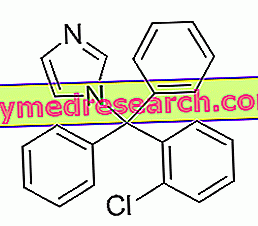
Characteristics of the medicinal product
Macugen is a solution administered by intraocular injection (in the eye). The injection is performed by an ophthalmologist (eye specialist) expert in this type of operation.
The active substance is pegaptanib sodium.
Utility
Macugen is used to treat the exudative (wet) form of age-related macular degeneration (AMD). It is a disease that affects the central part of the retina (called the macula), at the bottom of the eye, causing loss of vision. The macula makes possible the central vision necessary to guide, read the tiny characters and other similar activities. The wet form of the disease is caused by the presence of abnormal blood vessels under the retina and the macula, with the possibility of bleeding and leakage of fluids; this causes vision loss. The disease is rare under the age of 55, while it is more frequent from the age of 75 (it affects one in 20 people in this age group).
Method of use
Macugen should be injected into the affected eye every 6 weeks by an ophthalmologist experienced in this type of injection.
The injection is preceded by local anesthesia, to reduce or prevent pain. Antibiotic drops can also be instilled into the eye before the Macugen injection to prevent eye infections.
Mechanisms of action
Macugen blocks a substance, the "vascular endothelial growth factor" or VEGF, which is responsible for the growth of blood vessels as well as the leakage of fluid from the vessels and swelling. These effects are believed to worsen the disease.
Macugen blocks this factor by reducing the growth of the affected blood vessels, thus also bleeding and fluid loss.
Studies carried out
Macugen has been the subject of two main clinical studies, involving 1190 patients and lasting up to two years. The aim of the studies was to evaluate the safety and efficacy of Macugen in three different dosages: 0.3 mg, 1 mg and 3 mg. The effects were compared with the normal therapy which involves a simulated intervention (placebo), which consists of the same procedure but without a needle and without Macugen injection.
During the studies, in addition to Macugen and the simulated intervention, the use of photodynamic therapy was also admitted.
Benefits found following the studies
After one year of treatment, the group of patients treated with Macugen at 0.3 mg and 1 mg showed, with respect to the group treated with the simulated operation, a lesser worsening of vision. The improvement proved to be lasting in patients who continued treatment with Macugen for two years.
Associated risks
The most common side effects, which affected over 10% of patients who participated in clinical studies, are eye problems due to the injection itself rather than to the drug. For example, there may be a temporary increase in eye pressure; the ophthalmologist will check that this does not happen after the injection, possibly adopting the appropriate countermeasures. Another possible side effect of Macugen is endophthalmitis (internal infection of the eye), which should be treated as soon as possible. The illustrative leaflet describes the symptoms and related countermeasures.
For a full description of the side effects associated with Macugen, see the Package Leaflet.
Macugen should not be used in patients with known or suspected infection of the eye or eye region. It should also not be used in patients who may be hypersensitive (allergic) to pegaptanib sodium or to any of the excipients. In some rare cases, severe allergic reactions occurred immediately after the injection. The leaflet invites patients to report any known allergies to the doctor.
Grounds for approval
The Committee for Medicinal Products for Human Use (CHMP) found, based on a comparison with patients treated with simulated surgery, that Macugen reduces vision loss in patients with exudative age-related macular degeneration when administered for 1 year in the dosages 0.3 mg and 1 mg.
The effects of Macugen 0.3 mg and 1 mg are almost equal, so the 0.3 mg dosage was authorized. It is important to point out that Macugen only slightly slows down the process of vision loss and that it is a disease serious that also requires other therapies. The CHMP determined that the benefits of Macugen outweigh the associated risks and therefore recommended that a marketing authorization be issued, which means that doctors can prescribe it.
Measures to be taken to minimize related risks
The company that makes Macugen will provide instructions to doctors (to minimize the risks associated with eye injection) and to patients (to teach them to recognize any serious side effects and cases that require immediate medical attention). The company will also try to determine if there are categories of patients with a greater risk of side effects.
Further information
On 31. January 2006, the European Commission issued a marketing authorization valid for Macugen to Pfizer Limited, valid throughout the European Union.
The full version of the evaluation (EPAR) can be found at the following address.
Last update: 1-2006.



